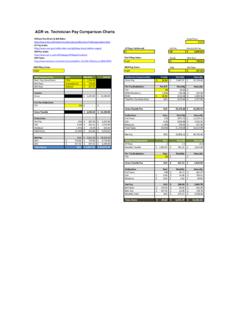Transcription of TITLE 32 MILITARY TECHNICAN CONVERSION TO …
1 TITLE 32 MILITARY TECHNICAN CONVERSION TO TITLE 5 EMPLOYEES INFORMATION PAPER SUMMARY The fiscal year (FY) 2016 National Defense Authorization Act (NDAA) requires that a certain number and type of state-managed National Guard MILITARY technicians be converted to federally-managed civilian employees (Section 1053). Forty-four governors sent a letter to Congressional leadership in March expressing concerns that the provision will negatively impact National Guard readiness, increase costs and reduce resources available to states during times of emergency.
2 The letter urged Congress to maintain state authority over full-time MILITARY technicians to ensure effective management of National Guard forces when not in federal status. A working group of adjutants general was convened to provide additional information to Congress on state administration of the MILITARY Technician program and likely impacts of the CONVERSION provision in the field. The issues studied by the working group and its initial findings are summarized below. KEY PRIORITIES FOR STATES Prevent unintended consequences to National Guard readiness.
3 Protect the resources available to states and the federal government for immediate response. Maintain states flexibility in managing and accessing full-time staff. Retain state management over administration of personnel. Allow time for continued discussion and analysis of potential improvements to the MILITARY Technician program and mitigation of concerns with the Section 1053 provision as enacted. SUMMARY OF AREAS OF STUDY Impact on Readiness for State Missions o The National Guard full-time force is essential to maintaining task-organized unit readiness for state missions.
4 O Dual-Status Technicians are the most flexible and immediately available full-time resource governors have - and therefore depend on - for responding to state emergencies. o The CONVERSION of Technicians to TITLE 5 civilian employee status decreases state emergency response capacity primarily because TITLE 5 employees are not subject to a governor s emergency powers and cannot be involuntarily used in emergency response. o Implementation of the CONVERSION of MILITARY Technicians under Section 1053 would result in the loss of nearly 10,000 Dual-Status Technicians available for no-notice/time-sensitive state response in support of civil authorities.
5 Impact on Readiness for Federal Missions o MILITARY Technicians provide critical full-time support and continuity in the operation and training of National Guard units. o They are the only immediately available full-time force for mobilizing, training and deploying the balance of the traditional part-time force for federal combat operations and federal response to catastrophic emergencies at home. o Many MILITARY responders following the 9/11 terrorist attacks were MILITARY Technicians who were available for no-notice mobilization under a federal call for assistance.
6 O The September 2013 Center for Naval Analysis study which reviewed the MILITARY Technician program acknowledges the adverse impact of converting all but a limited number of TITLE 32 MILITARY Technicians to TITLE 5 civilian employees due to readiness and cost concerns. 2 Employee Due Process Rights o The critical MILITARY mission and unique state and federal operational requirements of the National Guard, distinguishes the federal MILITARY Technician program from other federal employment programs, such as TITLE 5 employees. o The MILITARY Technician Act of 1968 expressly recognized the MILITARY requirements and state characteristics of the National Guard by providing for certain statutory administrative authority at the state level with respect to the Technician program.
7 O Both the TITLE 32 MILITARY Technician program and the TITLE 5 civilian employee system provide full due process protections as prescribed by federal law and federal court decisions. o MILITARY Technicians receive the full due process provided by law and federal court decisions for the specially focused MILITARY Technician program. Employee Access to Benefits o The purpose of the MILITARY Technician Act of 1968 was to address the lack of uniformity in fringe benefits paid to state MILITARY technicians who were originally state employees whose salaries were paid in full by the federal government.
8 O Employees in the TITLE 32 MILITARY Technician program, like their TITLE 5 civilian employee counterparts, enjoy access to processes for administrative appeal and adjudication of EEO complaints. o Many key benefits exist in both employment systems, but where there are differences, they are driven by the mission requirements of the individual program. o TITLE 5 is the system to provide standardization in human resources across federal organizations with varied missions, however, many agencies, programs and positions have exemptions based on a workforce that is uniquely different from the regular civil service or organizations that have a critical mission.
9 O Congress considered the MILITARY mission of the technicians to be paramount. MILITARY Technician Position Descriptions o All Dual-Status Technicians have a position description that is approved by the National Guard Bureau in compliance with federal Office of Personnel Management standards. o States are required to use these program descriptions and may assign Technicians only to those program descriptions approved by the National Guard Bureau. o The 0300 occupational series ( general administrative, clerical and office support) is used throughout the Guard for critical leadership and program management positions such as wing commanders, directors, aircraft maintenance officers, brigade and battalion administrative officers, and logistics management specialists.
10 Non-Dual Status Technician Force o Non-Dual Status (NDS) Technicians hold a unique function and importance to National Guard force structure. o NDS positions provide Adjutants General with a limited, but ready pool of non-deployable full-time employees during periods of high federal mission churn and deployment of large segments of National Guard forces available for emergency response. o Elimination or substantial reduction of NDS positions would strip federal and state authorities of important human resources for managing real property, facilities, equipment and supplies, especially during periods of high turnover or large-scale deployments.








